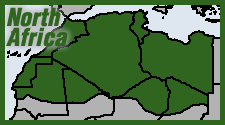 With ISIS in control of a chunk of Libya and Tunisia militarizing after a deadly terrorist attack, an article appears in the United Arab Emirates' The National warning of a "narco-jihadist" threat in North Africa. The commentary by Abdelkader Cheref, a professor at the State University of New York, warns that "huge quantities of Moroccan hashish transit through the Sahara where so-called narco-jihadists, who control a triangle of no-man's land between northern Mali and Niger, eastern Mauritania, southern Algeria and Libya, smuggle the shipments to Europe. There are mounting concerns regarding the links between Moroccan drug barons and narco-jihadists linked to Al Qaeda in the Islamic Maghreb and the Movement for Unity and Jihad in West Africa."
With ISIS in control of a chunk of Libya and Tunisia militarizing after a deadly terrorist attack, an article appears in the United Arab Emirates' The National warning of a "narco-jihadist" threat in North Africa. The commentary by Abdelkader Cheref, a professor at the State University of New York, warns that "huge quantities of Moroccan hashish transit through the Sahara where so-called narco-jihadists, who control a triangle of no-man's land between northern Mali and Niger, eastern Mauritania, southern Algeria and Libya, smuggle the shipments to Europe. There are mounting concerns regarding the links between Moroccan drug barons and narco-jihadists linked to Al Qaeda in the Islamic Maghreb and the Movement for Unity and Jihad in West Africa."
These two outfits, known by their acronyms AQIM and MUJAO, were actually in control of a vast area of northern Mali for over a year before they were ousted by a French-led military offensive in 2013. AQIM-MUJAO and allied jihadist militias are still waging a lively insurgency in Mali, that is even starting to spill into neighboring countries. But are they really involved in the hashish trade? It would be pretty funny, given that these guys (of course) will stone you to death for smoking the stuff. But we've noted such hypocricies before. The UN Office on Drugs and Crime (UNODC) recently warned that AQIM has "formed alliances with drug traffickers." Experts have linked Nigeria's Boko Haram extremists to the trans-Sahara drug trade. And in 2009, the DEA busted three supposed AQIM operatives for attempting to set up a big cocaine deal (although the guys the three thought were Colombian coke suppliers were really DEA agents). Cheref, however, doesn't cite any evidence for his claim.
He does note a growing backlash against the hashish economy in tthe region. He writes that Mohammed Safahi, vice-president of the Communal Council in Algeria's western province of Tlemcen, addressed Morocco’s king, Mohammed VI, in these strident terms: "Your Majesty, you the so-called commander of the faithful, stop flooding Arab and Muslim nations, from Mauritania and Algeria to Tunisia and Egypt, with tonnes of hash which is planted and harvested in your kingdom."
And he cites UNODC findings that seizures of Moroccan cannabis resin (hashish) have increased considerably in Algeria, rising from 53 tons in 2011 to 157 ton in 2012. In just the first eight months of 2013, Algerian authorities seized 127 tons—and this despite the fact that the border with Morocco is supposedly sealed.
He also notes that, under pressure from a 30% unemployment rate, Moroccan authorities are considering decriminalizing the hashish industry. Both the ruling Islamist-oriented Justice and Development Party as well as the slightly more secular opposition Authenticity and Modernity Party have broached this. "The logic for doing so would be that it would regulate the industry and allow the government to generate revenue from it," Cheref writes.
But he's not enthused. He follows up: "In the meantime, Moroccan hashish is flooding into neighbouring countries. The growing traffic in kif (herbal cannabis) is also taking its toll on millions of young men and women in the Maghreb."
This is a problematic construction. For starters, the professor is being a little sloppy here. Kif is not herbaceous cannabis, very little of which is exported from Morocco. Nor is it hashish, despite much confusion about this in media reports. Kif is actually the fine powder of THC crystals shaken from the buds—from which hashish is made. It is also widely smoked in powder form within Morocco, but relatively little of it is exported, as compact hashish is so much easier to smuggle.
And we also have to dissent from that line about cannabis "taking its toll on millions of young men and women in the Maghreb," or North Africa. The most deleterious aspects of cannabis—including its control by criminal and terrorist networks—are a product of its outlawed status.
Cross-post to High Times
-->







Recent comments
3 weeks 10 hours ago
3 weeks 17 hours ago
6 weeks 1 day ago
7 weeks 17 hours ago
11 weeks 1 day ago
14 weeks 6 days ago
18 weeks 6 days ago
19 weeks 4 days ago
29 weeks 4 days ago
33 weeks 5 days ago